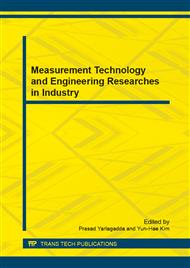[1]
Ho, Li-An. THE ANTECEDENTS OF E-LEARNING OUTCOME: AN EXAMINATION OF SYSTEM QUALITY, TECHNOLOGY READINESS, AND LEARNING BEHAVIOR. ADOLESCENCE, 44(175): 581-599, (2009).
Google Scholar
[2]
Alkhattabi, Mona; Neagu, Daniel; Cullen, Andrea. Assessing information quality of e-learning systems: a web mining approach. COMPUTERS IN HUMAN BEHAVIOR, 27(2): 862-873, (2011).
DOI: 10.1016/j.chb.2010.11.011
Google Scholar
[3]
Chen, Yu-Chien, et al. Development and evaluation of a Web 2. 0 annotation system as a learning tool in an e-learning environment. COMPUTERS & EDUCATION, 58(4): 1094-1105, (2012).
DOI: 10.1016/j.compedu.2011.12.017
Google Scholar
[4]
Lee, Chun-Hsiung; Lee, Gwo-Guang; Leu, Yungho. The effectiveness of an Intelligent Annotation Sharing System on e-learning. EXPERT SYSTEMS WITH APPLICATIONS, 36(3): 5733-5740, (2009).
DOI: 10.1016/j.eswa.2008.06.111
Google Scholar
[5]
Tai, David Wen-Shung; Wu, Hui-Ju; Li, Pi-Hsiang. Effective e-learning recommendation system based on self-organizing maps and association mining. ELECTRONIC LIBRARY, 26(3): 329-344, (2008).
DOI: 10.1108/02640470810879482
Google Scholar
[6]
Tseng, Ming-Lang; Lin, Ru-Jen; Chen, Hui-Ping. Evaluating the effectiveness of e-learning system in uncertainty. INDUSTRIAL MANAGEMENT & DATA SYSTEMS, 111(5-6): 869-889, (2011).
DOI: 10.1108/02635571111144955
Google Scholar
[7]
Palacios-Marques, Daniel; Cortes-Grao, Rocio; Lobato Carral, Clemente. Outstanding knowledge competences and web 2. 0 practices for developing successful e-learning project management. INTERNATIONAL JOURNAL OF PROJECT MANAGEMENT, 31(1): 14-21, (2013).
DOI: 10.1016/j.ijproman.2012.08.002
Google Scholar
[8]
Chiu, Hsiao-Ya; Sheng, Chieh-Chung; Chen, An-Pin. Modeling agent-based performance evaluation for e-learning systems. ELECTRONIC LIBRARY, 26(3): 345-362, (2008).
DOI: 10.1108/02640470810879491
Google Scholar
[9]
Kurilovas, Eugenijus; Dagiene, Valentina. Multiple Criteria Comparative Evaluation of E-Learning Systems and Components. INFORMATICA, 20(4): 499-518, (2009).
DOI: 10.15388/informatica.2009.263
Google Scholar
[10]
Jeong, Hwa-Young. Component based e-learning system using item analysis. LECTURE NOTES IN COMPUTER SCIENCE, 3942: 326-329, (2006).
Google Scholar
[11]
Hogo, Mofreh A. Evaluation of e-learning systems based on fuzzy clustering models and statistical tools. EXPERT SYSTEMS WITH APPLICATIONS, 37(10): 6891-6903, (2010).
DOI: 10.1016/j.eswa.2010.03.032
Google Scholar
[12]
Ferreira-Satler, Mateus, et al. Fuzzy ontologies-based user profiles applied to enhance e-learning activities. SOFT COMPUTING, 16(7): 1129-1141, (2012).
DOI: 10.1007/s00500-011-0788-y
Google Scholar
[13]
Shee, Daniel Y.; Wang, Yi-Shun. Multi-criteria evaluation of the web-based e-learning system: A methodology based on learner satisfaction and its applications. COMPUTERS & EDUCATION, 50(3): 894-905, (2008).
DOI: 10.1016/j.compedu.2006.09.005
Google Scholar
[14]
De Maio, C., et al. RSS-based e-learning recommendations exploiting fuzzy FCA for Knowledge Modeling. APPLIED SOFT COMPUTING, 12(1): 113-124, (2012).
DOI: 10.1016/j.asoc.2011.09.004
Google Scholar
[15]
Bueyuekoezkan, Guelcin; Arsenyan, Jbid; Ertek, Guerdal. Evaluation of E-Learning Web Sites Using Fuzzy Axiomatic Design Based Approach. INTERNATIONAL JOURNAL OF COMPUTATIONAL INTELLIGENCE SYSTEMS, 3(1): 28-42, (2010).
DOI: 10.1080/18756891.2010.9727675
Google Scholar


